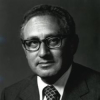Henry A. Kissinger

Henry A. Kissinger
Henry Alfred Kissingeris an American diplomat and political scientist. He served as National Security Advisor and later concurrently as United States Secretary of State in the administrations of presidents Richard Nixon and Gerald Ford. For his actions negotiating the ceasefire in Vietnam, Kissinger received the 1973 Nobel Peace Prize under controversial circumstances, with two members of the committee resigning in protest. Kissinger later sought, unsuccessfully, to return the prize. After his term, his advice has been sought by world leaders...
NationalityGerman
ProfessionStatesman
Date of Birth27 May 1923
CountryGermany
I think a resumption of the Cold War would be a historic tragedy. If a conflict is avoidable, on a basis reflecting morality and security, one should try to avoid it.
In a diplomatic negotiation, you always meet the same the other side all the time. Even if you should succeed in outsmarting him or in pressuring him, it only sets up a cycle in which he will try to get even.
When you travel as secretary, one problem you have is that the press comes with you and wants an immediate result because it justifies their trip. And sometimes the best result is that you don't try to get a result but try to get an understanding for the next time you go to them.
I want to get into the President's head some idea of what he can do. If military actions are recommended to him for decision, I want him to know what he is doing when he decides.
Congress can't do much more damage to us than they already have. To this extent we're liberated to do what is right. ... Our successors will be living in a nightmare if we don't do what is right.
an occasion to blow off their frustrations on an issue on which they didn't look as if they are begging (the United States) for help.
a review of withdrawal strategy ... seems in order.
My heart goes out to the president because I've served in an administration that faced a very divided country in a very difficult set of circumstances.
Because of the axiom that guerrillas win if they do not lose, stalemate is unacceptable, ... the military challenge in Iraq is more elusive.
Ninety percent of all politicians give the other ten percent a bad reputation.
I'm confident John Bolton will bring peace to the world before he brings peace to his relations with The New York Times,
We will go where the facts lead us,
If you don't know where you are going, every road will get you nowhere.
We'll do it in the quickest way possible that is compatible with foreigners and making sure that when the report is finished, there can be no question about the fact that every aspect has been explored, ... Late Edition With Wolf Blitzer.